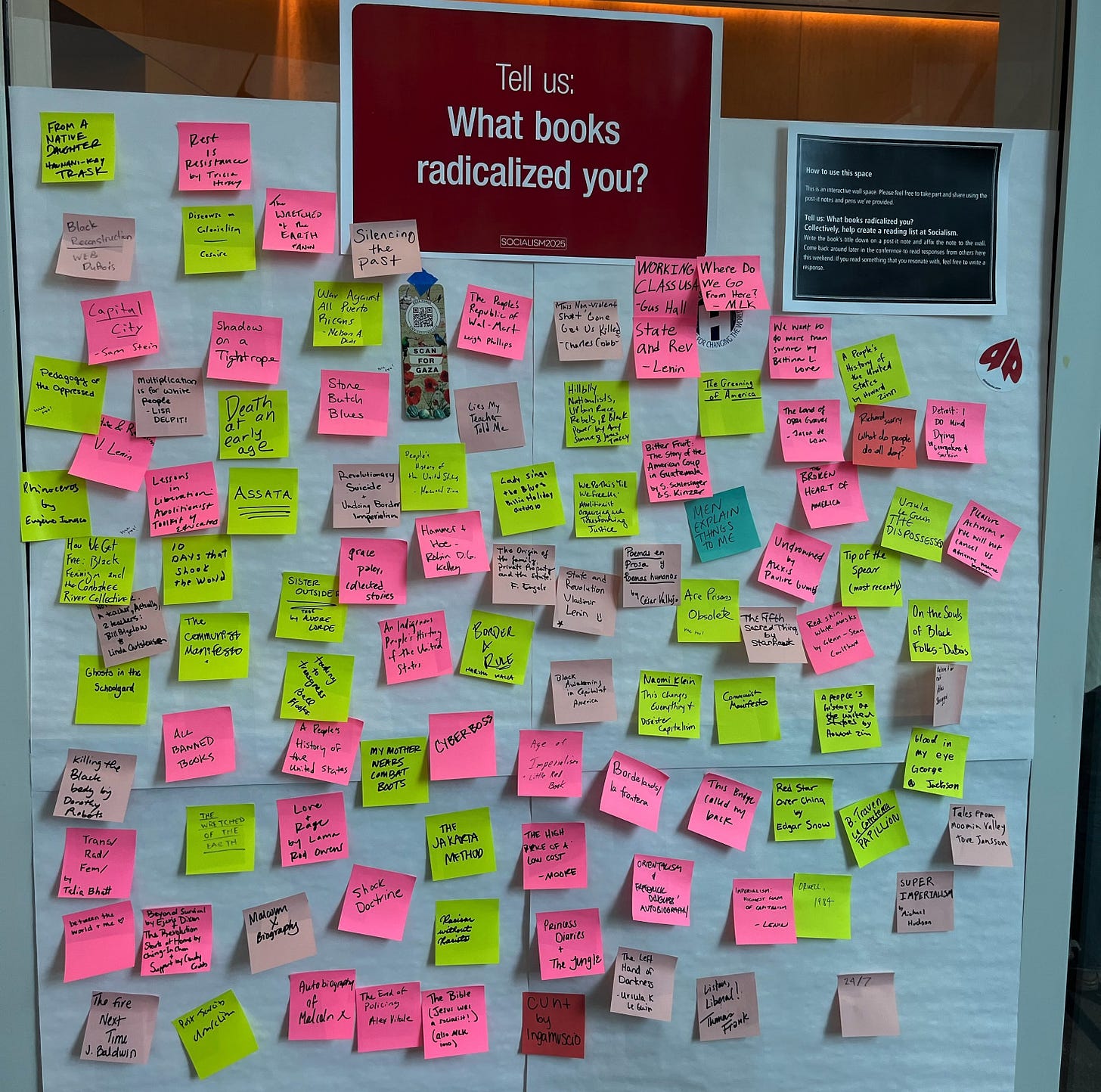My return to the United States last month (after 9 months in Hong Kong) has brought…mixed emotions. On one hand, I’ve reconnected with all the things I dearly missed—family, friends, nature, the richness of Chicago, communicating in my mother tongue—but on the other, as you’re all aware, the country ain’t doing so hot right now.
Being away from the US while shit was hitting the fan was uniquely surreal. In Hong Kong I had no direct visibility into the rise of fascism—the consequences were far away and threat to my daily life was nonexistent. News from back home would come while I was sleeping, making my morning showers anxiety-inducing, but thought-provoking.
I did a lot of thinking during this time. I would think on the bus, on hikes, while walking through the bustling streets filled with faces that didn’t understand how insidiously people were acting across the pond. And why would they? The US does what the US does, and in the eyes of outsiders, Trump is not so different than the violent, egotistical sociopaths that have been leading our country for decades.
My British friends understood a bit better; their own dying empire has enabled all sorts of nasty, nativist, right-populist rhetoric. Still, it felt uniquely lonely as I grew more radicalized, but with nobody to fight and nobody to fight with. I channeled a lot of that energy into education and my YouTube, which has grown more confrontational as society’s contradictions have sharpened in my mind.
Angela Davis defines radical as “grasping things at the root.” Radicalization means understanding the intersectionality of our conflicts, and that to fight against one is to fight against all. The fight for Palestinian liberation and self-determination, for instance, shares the same “root” as the fight against Big Tech’s data center expansion. The AI tools that tech companies so desperately “need” don’t just cost our communities access to water, land, and energy. They also cost Palestinians their lives.1
By Angela Davis’s definition, I was not radicalized before moving to Hong Kong. Sure, I called myself a democratic socialist, but I was not grasping things at the root. I may have understood that the root of all our problems is capitalism, but I couldn’t tell you why or how beyond generic platitudes. Radicalization means rejecting the “lives of quiet desperation” that the masses lead,2 moving beyond nihilism or blissful ignorance, to understanding and action.
I realized during my long walks and bus rides—staring out the window as I listened to podcast hosts and journalists and writers who grasped things at the root—that I had not until that point been a proper radical. And I made the commitment to change that when I moved back home.
Radicalization is a journey, often a long one fraught with setbacks and rife with epiphanies. At this moment, many are reaching the epiphany that capitalism isn’t working and might very well lead to humanity’s destruction. Many are realizing that the Democratic party and the Republican party are two sides of the same coin. The strategies are different and the democrats are more palatable, but they serve the same masters—the rich and powerful. The latest exhibition of this truth is elucidated by journalist Chris Hedges in his piece on the Jeffery Epstein controversy.
The Epstein story is a window into the moral bankruptcy, hedonism and greed of the ruling class. This crosses political lines. It is the common denominator between Democratic politicians, such as Bill Clinton, philanthropists, such as Bill Gates, the billionaire class, and Trump. They are one class of predators and grifters. It is not only girls and women they exploit, but all of us.
My goal with this book club is to encourage an atmosphere of learning and political engagement—beyond electoral politics—that is desperately needed in these times. The books I select will be bleak at times and hopeful at others (probably more often the former). I don’t portend to be some visionary radical thinker; I feel very much in the early stages of my intellectual journey. As such, I hope that these posts are accessible and relatable for the majority of people who feel anxious and depressed about what lies ahead.
The worst thing we can do in this moment is fall into political nihilism or doomerism, thinking nothing we do matters so why even try? It’s a tempting response, but I would argue a cowardly one. And this is coming from someone who had this mindset for years, so I say that without judgment. I hope that wherever you fall on the political spectrum, and however much you’ve been engaged or disengaged, you will give these books a try. At the very least, they may expose you to perspectives you hadn’t considered.
Most books on this list are going to be non-fiction, but definitely not 100%. There will be some focused on theory/philosophy, some focused on action, some focused on specific issues, some focused on history, and even some fictional stories that bring to life anxieties of the present. Below is the tentative plan in case you want to start ordering the books.
This book club will be open to paid subscribers and Patrons only (posts will be cross-posted to Patreon). In case you don’t know, I am attempting to build a steady income from YouTube, which this Substack is in support of. And for something like this which I suspect will take up significant time, I can only do it with your financial support, so thank you in advance. And if I can get enough people on board, I expect to do some discussions over video call or streaming!
If money is an issue and you really want to be a part of the book club, please email me at thestorieswetell303@proton.me.
I’ve decided to keep this free and open to all. But if you appreciate the time and energy, I would nevertheless love to take your money.
August: Perfect Victims and the Politics of Appeal by Mohammed El-Kurd (Palestine/theory)
Purchase from Haymarket Books (paperback on sale for $10.77) or at a local bookstore/library
I just finished reading this as part of a book club for a Palestinian organization I have joined. It was actually suggested to me in my YouTube comment on my video, How the Media Manufactured Consent for a Genocide, and I’m glad it was!
In Perfect Victims, Mohammed El-Kurd presents an uncomfortable reality for how the Western world treats victims of imperial violence. We grant victims the privilege of survival and respect only if they are perfect—they have the right disposition, they are perfectly submissive, well spoken, have a fancy degree, political correctness, the “willingness to forgive, an unassuming gaze and unthreatening demeanor.” The Palestinian, El-Kurd says, must prove himself perfect if he is to be absolved of the “original sin” of being born Palestinian, if he is to be treated as human.
But what about those who are not perfect? “The others who suffocate under this shrinking definition of humanity? … What about those without halos, the angry men who wander the streets with mouths full of spit and venom, the children whose shoulders are burdened by the straps of rifles, the women who choose an explosive path? What about the poor? What about those who are cruel with the occupier and cruel with their kin? The not-so-gentle fathers? The reckless in our midst, those who would furrow the eyebrows of Europeans … Do they not deserve life? According to whose law?”
This is a truly poetic and eye-opening read into the ways we are conditioned to treat victims, not only of colonial violence, but of state repression, brutal immigration enforcement, manufactured scarcity that leads to homelessness and poverty, police brutality, censorship, and much more.
Reading plan
Since it may take people some time to acquire the book, we won’t officially start until August 1st, but if you’d like to get a head start, go right ahead. I am hoping to spend one month on each book, although this might change depending on the length and how quickly I am able to write up my thoughts. For now, here is what I plan for month 1.
Present-August 7: Ch. 1-3 (p. 1-77)
August-7-14: Ch. 4-6 (p. 78-124)
August 14-28: Ch. 7-10 (p. 125-214)
September & beyond (please vote in the comments if you’d like)
Let This Radicalize You - Kelly Hayes & Mariame Kaba (organizing/action)
How to Blow Up a Pipeline - Andres Malm (environment/action)
Empire of AI: Dreams & Nightmares In Sam Altman’s OpenAI - Karen Hao (technology/history)
Psychopolitics: Neoliberalism and New Technologies of Power - Byung-Chul Han
The Shock Doctrine: The Rise of Disaster Capitalism - Naomi Klein (history)
The Wretched of the Earth - Frantz Fanon (theory)
Blood in My Eye - George Jackson (theory/philosophy)
Full Spectrum Resistance - Aric McBay (organizing)
Women, Class & Race - Angela Davis (theory)
The Autobiography of Malcolm X - Malcolm X (history)
Blowback: The Costs and Consequences of American Empire - Chalmers Johnson (history)
The Souls of Black Folk - W.E.B. Du Bois (essays)
Our History is the Future - Nick Estes (history)
The Red Deal: Indigenous Action to Save Our Earth - The Red Nation
The Fire Next Time - James Baldwin (essays)
Discourse on Colonialism - Aime Cesaire (history/theory)
Blood in the Machine - Brian Merchant (technology/history)
Invisible Man - Ralph Elison (fiction)
Beloved - Toni Morrison (fiction)
Dawn - Octavia Butler (fiction)
Parable of the Sower - Octavia Butler (fiction)
Manituana - Wu Ming (fiction)
P.S. Here are some books that have played a part in a radicalization up to now (chronological; bolded are the truly eye-opening picks)
Non-Fiction
Live from Death Row - Mumia Abu-Jamal
Assata: An Autobiography - Assata Shakur
The Invention of Nature: Alexander Von Humboldt's New World - Andrea Wulf
Tao Te Ching - Laozi
Discourse on Colonialism - Aimé Césaire
The Burnout Society - Byung-Chul Han
What We Say Goes: Conversations on U.S. Power in a Changing World - Noam Chomsky
Manufacturing Consent: The Political Economy of the Mass Media - Edward S. Herman, Noam Chomsky
Psychopolitics: Neoliberalism and New Technologies of Power - Byung-Chul Han
Palo Alto: A History of California, Capitalism, and the World - Malcolm Harris
Empire of AI: Dreams and Nightmares in Sam Altman's OpenAI - Karen Hao
The Shock Doctrine: The Rise of Disaster Capitalism - Naomi Klein
Fiction
Parable of the Sower - Octavia E. Butler
The Dispossessed - Ursula K Le Guin
The Sympathizer - Viet Thanh Nguyen
Brave New World - Aldous Huxley
https://www.aljazeera.com/opinions/2024/5/12/how-us-big-tech-supports-israels-ai-powered-genocide-and-apartheid
“The mass of men lead lives of quiet desperation.” - Henry David Thoreau, Walden






i’ll join in on this one - i’ve got some time this summer vacation!
I got my copy of the book, let's fucking go !!!